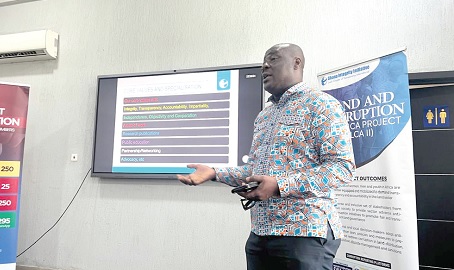Stakeholders in the land sector have said that the lack of enforcement of provisions in the Land Act, 2020 (Act 1036), was a major catalyst for corruption in the sector.
They said although Act 1036 had introduced substantive reforms to sanitise the land administration system, they were not being implemented due to the limitations of the systems.
The stakeholders were speaking at a forum on Land and Corruption in Africa project, an initiative by Transparency International.
It is aimed at creating awareness about corruption in the land administration system in the country, and how best to combat it.
The project also seeks to empower citizens of Africa to defend their rights and ensure transparency and accountability from their governments to end corruption in the land sector.
They are also engaging stakeholders from civil society organisations, the private sector and public institutions on land related anti corruption initiatives to promote good land governance.
Reforms
The Land Act, 2020 (Act 1036), which had consolidated most of the laws on land administration had introduced major reforms to streamline land acquisition, and also prevent abuse and corruption in the land administration process.
For instance, under the law, chiefs have a fiduciary duty to deal with land in a fair and transparent manner.
A chief who fails to do so commits a criminal offence which attracts a fine of not more than GH¢120,000 and a term of imprisonment of not more than 10 years.
Also, traditional councils have been enjoined under the law to set up customary land secretariats in their jurisdictions to ensure proper accounts and records in land transactions.
The law also criminalises multiple sale of land, land ‘guardism’ or any form of intimidation or coercion against persons who have validly acquired lands.
Sensitisation
The Project Coordinator, Micheal Okine, said apart from the implementation and enforcement of the law, it was equally important to increase sensitisation to create awareness of the rights people have under the law.
“Many people are not aware of their rights under the law and, therefore, are not assertive when it comes to land matters.
“Awareness should not be a one-off activity. It should be continuous to make people fully understand and appreciate the law,” he added.
Causes
The Executive Director of the Centre for Environmental Impact Analysis, Dr Samuel Obiri, said corruption in the land sector was caused by factors such as population growth, exploitation of natural resources, poor governance framework and flawed policies.
“Improving land governance is a necessary first step to address corruption, and needs to be applied at the policy, legal, institutional and administrative levels with the objective of making them more transparent, efficient and participatory,” he said.

